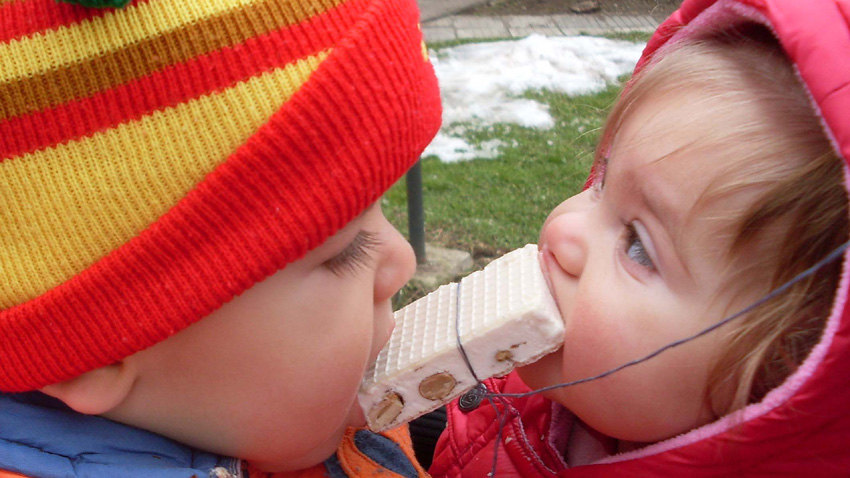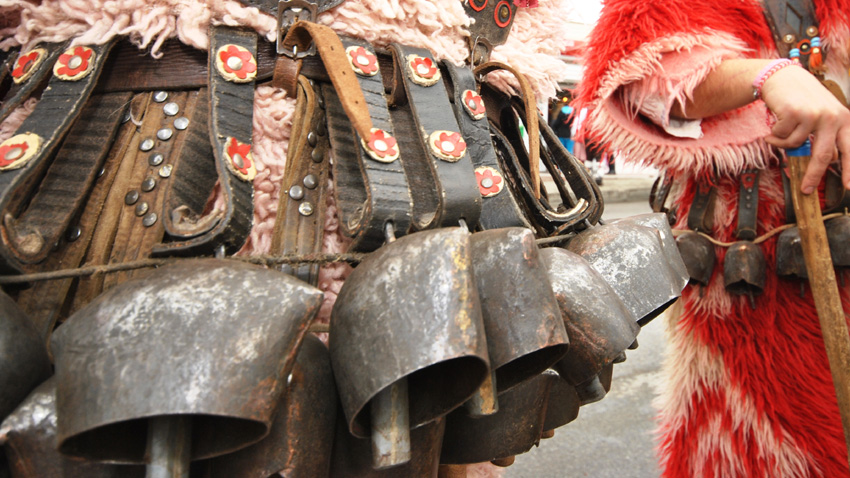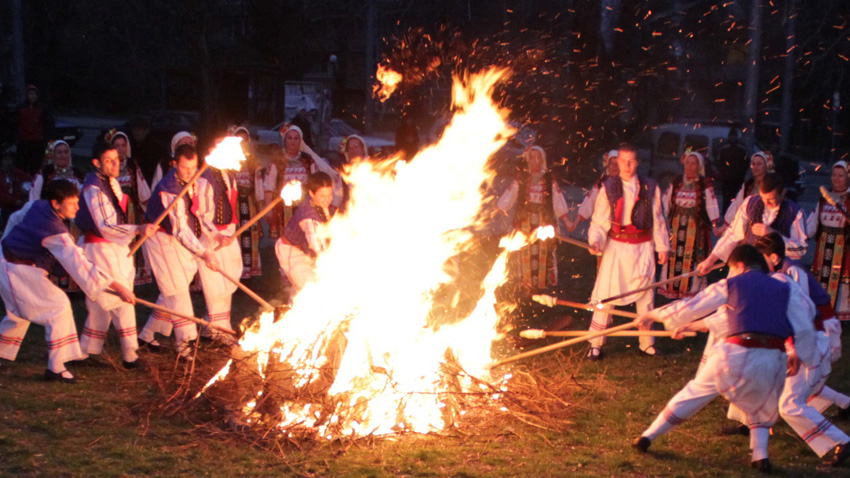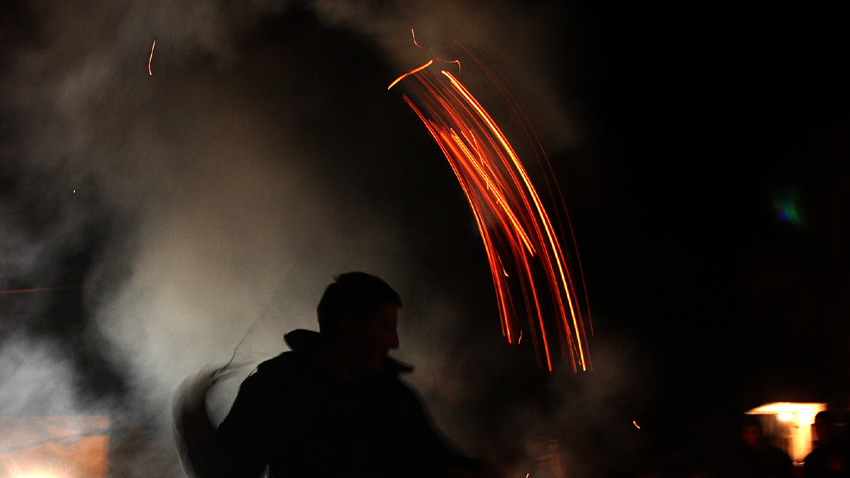Sirni Zagovezni or Sirnitsa (Cheesefare Sunday) is a time for asking your nearest and dearest for their forgiveness, a time to sit down to table and share a meal of everything made out of eggs, butter and milk. Sirnitsa is a movable feast, always falling seven weeks before Easter. The following day is the first day of the long Lent preceding Easter.
Nowadays many people choose to fast (meaning they do not eat meat or dairy products or eggs) and steer clear of temptation in thoughts, words or deeds. But even those who do not, honour this day and are invited to share it with their loved ones.
The week preceding Sirnitsa is called Sirna Nedelya (Cheesefare week), a time to enjoy oneself and eat everything that will be forbidden during Lent. Once, lads and lasses of marriageable age would swing on swings and dance the horo because that too would be forbidden right up until Easter; so were weddings. Sirnitsa always falls on a Sunday and the day passes in visiting with loved ones - to ask their forgiveness and to be forgiven. The young would go to the homes of their parents, their in-laws, their older relatives. If the husband was an artisan, he would ask forgiveness of the master craftsman he learnt the trade with or was still working for. It is said  that before sitting down to the festive dinner, you should have asked the forgiveness of all people you hold near and dear, or fasting cannot begin. Asking for forgiveness is as much a way to cleanse oneself physically, as it is a way to mark a new beginning. Women bake loaves of white bread, provide the wine and bring the family together at table.
that before sitting down to the festive dinner, you should have asked the forgiveness of all people you hold near and dear, or fasting cannot begin. Asking for forgiveness is as much a way to cleanse oneself physically, as it is a way to mark a new beginning. Women bake loaves of white bread, provide the wine and bring the family together at table.
Alongside the traditional banitsa and all other dishes made out of cheese, milk, butter and eggs, the dinner must also include boiled eggs and white khalva. A ritual known as hamkane is performed across the country, using either a boiled egg or white khalva. Strung up by a red thread or Martenitsa, it is suspended from a beam on the ceiling, and the oldest woman of the household sets it swinging in circular motion. The children then have to try and catch the egg (or khalva), but without using their hands, just their mouths. It is said that whoever does so first, shall be healthy, happy and have good luck throughout the year.

During the week that precedes Cheesefare Sunday, kuker (mummer) masquerade processions are organized in some towns and villages, mostly in Southern Bulgaria. Masked men go round the homes in the town or village, enacting comic scenes and blessing the households for health and prosperity. On Sirnitsa night, bonfires are lit; around them the horo is danced, while young men leap over the flames for health. After the purifying feast days connected with water – Epiphany (Yordanovden), St. John’s day (Ivanovden) and Midwives’ day (Babinden), come “bonfire” feast days – Sirnitsa, Granny Marta (1 March), 40 martyrs (Mladentsi)… right up to Annunciation day. It is believed that the earthly fire shall reinforce the heavenly flame – the sun, the oldest cult of all. The arrows young men shoot into the yards of their beloved in the night, were also set on fire. These arrows were made especially for the purpose long before Sirnitsa, and the archers would start training on Athanasius Day, January 18. Before they were shot, the tips of the arrows were set on fire. The young men would shoot them in the direction of the houses of their beloved with specially made poles. The fiery messages would sear through the dark and anyone could trace their path and see where they fall. On the following morning, the girls of marriageable age would go out into the yard with their parents to count the arrows. The lass who got the greatest number of these “love messages” was the envy of all; nobody envied a girl who got no arrows.

The lyrics of songs about the shooting of fiery arrows often revolved around one and the same story – a young man shoots an arrow and tells his beloved to prepare “fine gifts” because he will be sending matchmakers. But even before these words are out of his mouth, matchmakers fill the girl’s yard, tie their horses to the yellow quince tree or beneath the red rose. For each one of them there is a gift, for the eldest matchmaker (a relative of the would-be-groom or a respected man from the community) – there are two gifts. The swings and the fiery arrows are elements of the pre-nuptial rituals performed; weddings will only be allowed after Easter.

Fire is an element of other rituals performed on Cheesefare Sunday, called palikosh or oydalalia depending on what part of the country they come from. Bonfires are usually lit on the hills around the town or village – it is believed that the farther the light reaches, the more fertility there will be throughout the year.
English version: Milena Daynova
The Surva festival begins with the lighting of bonfires and mummers dancing the horo chain danie around the fires on the night of January 13-14. The power and timelessness of the masquerade tradition has led UNESCO to declare it a World Heritage..
Mummers from the neighborhoods of Bulgaria's town of Blagoevgrad, the neighboring villages and guests from Petrich paraded at a carnival in the regional town, as the sounds of hundreds of bells filled the town. For yet another year, the Mummers'..
For more than 20 years in the city of Montana, there has been a tradition on January 6 for people to go to Montanenzium Park, where there is an artificial lake, suitable for conducting the Orthodox Christian ritual called "Saving the Holy Cross" on the..

+359 2 9336 661
